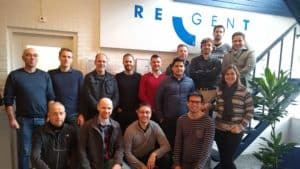Brazil takes important fast climate action steps forward with new nationwide energy efficient, higher performance, commercial refrigerators planned for all sectors.

Brazil has long experience in implementing energy efficiency policies for domestic cooling appliances, such as air conditioners and refrigerators, and has now turned its attention to the commercial refrigeration sector. A sector, made up mainly of wholesalers, retailers (e.g., supermarkets), hotels and restaurants, offering high potential in reducing national energy consumption by implementing higher performance energy efficiency standards and regulations to international norms.
The Leapfrogging to Energy-Efficient and Climate Friendly Commercial Refrigerating Appliances in Brazil project is the first to benefit from U4E’s growing expertise in this sector – underpinned by the publication of the Model Regulation Guidelines for Energy-Efficient and Climate-Friendly Commercial Refrigeration Equipment in November 2021 and the inclusion of commercial refrigeration products in the 2022 update of the U4E country savings assessments. The project aims to help Brazil tackle the high energy use in this sector by making a sustainable transition to energy-efficient and climate friendly commercial refrigerators through the development of Minimum and Higher Energy Performance Standards (MEPS and HEPS) and corresponding energy efficiency labels as well as implementation of effective monitoring verification and enforcement mechanisms based on international testing standards while also enhancing national stakeholder capacity in all these areas.
- Introduction to test procedures according to international standards for energy consumption, volume and display area calculation, climate class, temperature class, half reload test, and cabinet preparation for the different tests – ISO 23953: Refrigerated display cabinets, ISO 22043: Ice-cream freezers, ISO 22044: Beverage coolers
- Laboratory tour and familiarization with measurement equipment, such as climate rooms, sensors and control equipment
- In-house calibration of laboratory equipment and uncertainty calculation
- Practical sessions for conducting various test methods for measurement of commercial refrigerators, especially as regards loading plan preparation, volume and total display area measurement
- Climate room design
- Classification of the different types and sub-types of commercial refrigerators
Furthermore, the training allowed for discussion on different aspects of the standards that are free for interpretation, sharing experience on how each manufacturer and Brazilian laboratories currently handle the testing of commercial refrigerators, as well as some Brazilian particularities where the test standards might need to be adapted for local implementation.
Speaking on behalf of the Ministry of Mines and Energy, Samira Fernandes de Sousa, General Energy Efficiency Coordinator, said “The training carried out in the Re/genT laboratory was a very valuable experience for everyone involved in the project. The group of participants was very experienced in performance testing of commercial refrigeration equipment, and brought very practical discussions about carrying out the tests, the necessary tools and, especially, on the interpretation of the norms that were the subject of the training. This very practical approach by technicians and coaches brought a wealth of information, both for those who will have to carry out the tests in Brazil, and for the preparation of the regulations themselves like the Ministry of Mines and Energy and INMETRO. We are very grateful to U4E and the GCF for the opportunity to include this training in the project activities.”
Speaking on behalf of SGS, a private Laboratory in Brazil, Maicon Olivera said, “The training was wonderful with complete content for us to discuss internally and begin to get a picture of the regulations for commercial refrigerators in Brazil. For us at SGS, such a training was very important because we have not carried out these tests yet, and through this activity, we were able to get an idea of how the tests are undertaken, being able to prepare ourselves more precisely for a possible investment to meet the requirements of the standard, in addition to understanding that it is always a good practice to align possible interpretations of the norms before putting a regulation into effect.”
To learn more about study tour the Leapfrogging to Energy-Efficient and Climate Friendly Commercial Refrigerating Appliances in Brazil project, please contact U4E’s Roberto Borjabad Roberto.borjabad@un.org or click here to download a copy of the project factsheet.